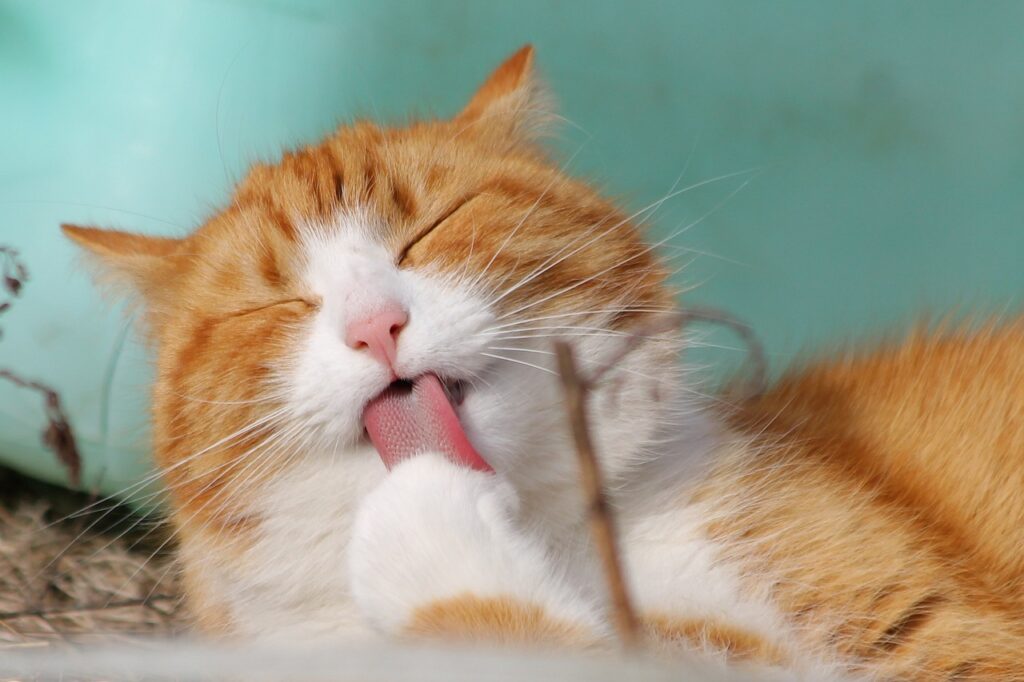Can Cats Eat Honey? – Yes, They can, but with caution
While honey is not toxic to cats, it should be given in very small amounts. This sweet treat contains sugars that cats don’t need in their diets and that can lead to obesity or dental issues over time if fed excessively. A tiny lick of honey now and then is unlikely to harm your feline friend, but it should not become a regular part of their diet.
Can Kittens Eat Honey?
No, kittens should not eat honey. Kittens have delicate digestive systems and need a diet that’s specifically tailored to their developmental stage. Introducing honey to a kitten’s diet can risk upsetting their stomach and also contribute no nutritional value for their growth needs.
Things to consider when feeding honey to kittens?
Due to their immature immune systems, kittens are more susceptible to bacteria found in honey, including botulism spores, which can be harmful. It’s best to stick to kitten-formulated food and consult a veterinarian before you introduce any human foods to a young cat’s diet.
Nutritional Benefits of Honey for Cats – Why Honey is Good for Cats
Energy Source
Honey is a quick energy source due to its high sugar content; so for cats needing a small energy boost, a tiny dab of honey might help. However, most cats don’t need supplemental sugars in their diet.
Antioxidants
Rich in antioxidants, honey could potentially provide some health benefits such as strengthening the immune system. But the minute quantities appropriate for a cat offset these benefits.
Antibacterial Properties
Honey has natural antibacterial properties, and while this could theoretically help with wound healing when applied topically, it’s not as straightforward for internal use in cats.
Vitamins
Honey contains trace amounts of vitamins which can be beneficial, yet cats have very specific dietary vitamin requirements that honey doesn’t significantly contribute to.
Minerals
There are various minerals found in honey, but again, the small serving size suitable for cats makes this an insignificant source of minerals.
Potential Allergies: Can Cats Be Allergic to Honey?
Cats can indeed develop allergies to any food, honey included. If a cat is allergic to honey, even a small taste can cause an adverse reaction.
Symptoms of Honey Allergies in Cats
- Gastrointestinal upset: If your cat experiences diarrhea or vomiting after consuming honey, it might be a sign of an allergy.
- Skin irritation: Watch for any unusual itching, redness, or swelling that occurs after exposure to honey.
- Respiratory symptoms: Difficulty breathing or wheezing could indicate an allergic reaction to honey.
What to Do If Your Cat Shows Symptoms?
- Immediate cessation: If you suspect an allergy, stop giving your cat honey at once.
- Vet visit: Seek veterinary care for proper diagnosis and treatment.
- Monitor closely: Keep an eye on your cat’s behavior and health following any allergic reaction.
Recommended Amount: How Much Honey Can a Cat Consume?
A cat should only consume honey in tiny amounts, such as a small lick off a spoon or the tip of your finger, and only on rare occasions. Regular or larger quantities can be harmful due to the high sugar content and potential for a high caloric intake leading to weight gain.
Things to Consider When Feeding Honey to Cats
Bear in mind that cats do not need added sugars in their diets. Feeding honey too often can contribute to health issues such as diabetes or dental problems, as well as potentially causing an upset stomach or allergies.
How to Feed Honey to Cats: A Quick Guide
Honey should be seen as an occasional treat rather than a dietary staple for your cat. If you choose to give your cat honey, it should be natural and pure, free from additives or sweeteners that could be toxic to your pet.
Simple Honey Treat
For a special treat, you might dab a tiny amount of pure honey on a plate for your cat to lick, but this should not happen often – think once every few months, if at all.
Honey-Glazed Carrot Treat
Very lightly glaze a small piece of cooked carrot with honey for a crunchy kitty treat. This should only be given sparingly and in small quantities to avoid any tummy troubles.
Catnip Honey Surprise
Combine a pinch of catnip with a minuscule drop of honey to entice your cat for a play session, allowing them to lick up the mix during their fun.
Conclusion
In conclusion, honey is not toxic to cats but should be given only occasionally and in very small amounts, if at all. There are no significant nutritional benefits for cats in honey, and the high sugar content can pose health risks. Kittens, in particular, should not be given honey due to their sensitive digestive systems. Always weigh the risks and consult with a veterinarian before introducing any human food to your cat’s diet, and monitor them for any signs of allergies or adverse reactions.



